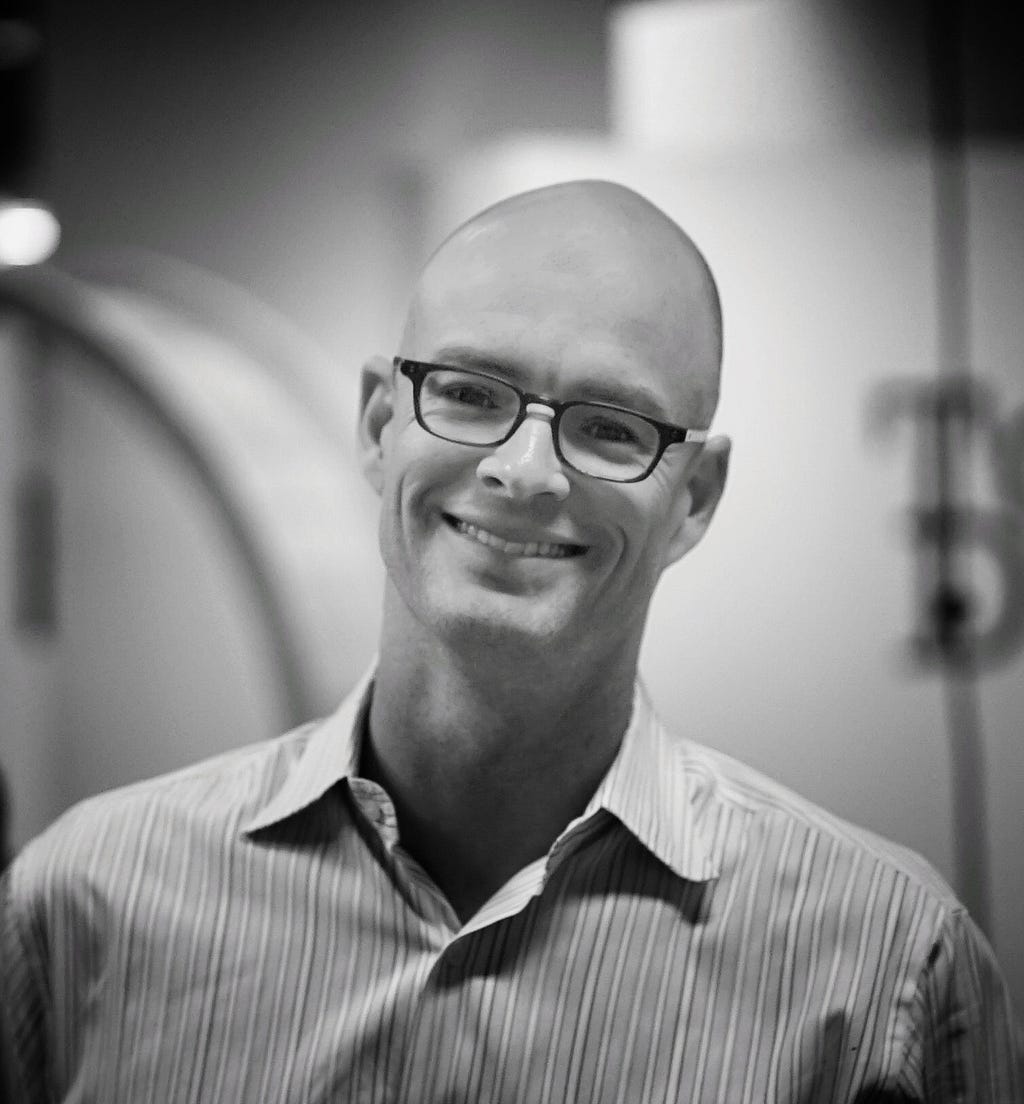Health Tech: Chris Gay On How Evry Health’s Technology Can Make An Important Impact On Our Overall Wellness

To build successful technology that positively impacts our society, the five things to know are to listen, solve problems, read, do things that don’t scale and build something people want.
In recent years, Big Tech has gotten a bad rep. But of course many tech companies are doing important work making monumental positive changes to society, health, and the environment. To highlight these, we started a new interview series about “Technology Making An Important Positive Social Impact”. We are interviewing leaders of tech companies who are creating or have created a tech product that is helping to make a positive change in people’s lives or the environment. As a part of this series, I had the pleasure of interviewing Chris Gay.
As Evry Health’s CEO and co-founder, Chris Gay is no stranger to the Dallas startup scene. A prior insurance company CEO, he founded Dallas-based MileMeter, a full auto insurance carrier that pioneered pay-per-mile insurance. MileMeter successfully reduced premiums by up to 50% and especially benefitted women and low-income households. MileMeter also engineered the first cloud software platform, giving insurers automated ratings, automated underwriting and systems for claims and policy management. After founding MileMeter, Gay led a successful business turnaround.
Thank you so much for joining us in this interview series. Before we dive in, our readers would love to learn a bit more about you. Can you tell us a bit about your childhood backstory and how you grew up?
My father was a US Army officer. Because of his profession, I grew up mostly in Germany and then went to boarding school in Tennessee. As a child, we had incredible freedom in Germany. We could ride our bicycles everywhere, through the forests, to the swimming pool, into castle ruins, and to go fishing in the ponds.
Can you share the most interesting story that happened to you since you began your career?
I once smuggled laptops into Nicaragua. We were growing a business in that country, and we couldn’t get computers to our growing staff quickly enough. The usual process for procuring computers was very slow and very expensive since computers were a highly tariffed item. It was far more efficient to source the laptops ourselves, including the fines when we were caught.
None of us are able to achieve success without some help along the way. Is there a particular person who you are grateful towards who helped get you to where you are? Can you share a story about that?
I have a long list of people who made my opportunities possible: my parents, my wife, my sister, dear friends, shareholders, coaches, priests, and great teachers.
Can you please give us your favorite “Life Lesson Quote”? Can you share how that was relevant to you in your life?
One of my favorite life lesson quotes is “instead of worrying about what you cannot control, shift your energy to what you can create.” In the health insurance space, I couldn’t control the way our country has set up health care. What I could control and do was to create a product (in this case health insurance) and company that is trying to change the health insurance space for the better.
You are a successful business leader. Which three character traits do you think were most instrumental to your success? Can you please share a story or example for each?
The three character traits that were most instrumental to my success were frugality, perseverance and being open to learning from others.
With frugality, I learned to live beneath my means. To seize and be ready for an opportunity, you will need to invest your time and/or capital. To do that, you must have savings. Living well beneath my means allowed me to be ready for any opportunity when it was presented to me
I had perseverance. Anything worth doing well takes years to create a meaningful return. In my experience, most people lack the patience, work ethic, and endurance to achieve long-term goals. Your success in meaningful projects (whether in artistic, athletic, or business endeavors) will be more likely if you learn to persevere through the years of hard work to a delayed reward.
My openness to be coachable was extremely valuable to my success. You can’t be an expert in everything, and you won’t always be correct. To succeed, you must accept criticism and feedback. You must listen and be coachable.
Ok super. Let’s now shift to the main part of our discussion about the tech tools that you are helping to create that can make a positive impact on our wellness. To begin, which particular problems are you aiming to solve?
Healthcare is too expensive, too difficult to access, and varies in quality. In the United States, the majority of Americans receive their healthcare through their employer-sponsored health plan. At Evry Health we provide full health insurance for mid-sized employers, that provides more effective medical care that costs 20% less.
How do you think your technology can address this?
To offer healthcare at a lower cost than traditional health insurance companies, we created software to automate roughly half of the routine tasks that are currently done by people (no one wants to do the same boring task every day) for claims administration, care coordination, and back-office administration. These efficiency savings are passed through to our customers and plan members.
Our technology offers on-demand care easy, with a gorgeous user experience. This helps people to engage with their own care and health more readily, at any time. To augment our in-network doctors, our telehealth doctors are available 24/7 for $0 (no deductibles and no copays).
We provide a high-quality medical network of in-network doctors and medical providers. We used data analysis to identify the best doctors and medical providers, and we directly contracted them.
We eliminated copays and deductibles. No one should worry about copays or deductibles. Also, every member gets a personalized care plan, supported by a care coordinator, rewards card (up to $1000 earned per plan year), and integrated wellness vendors.
Can you tell us the backstory about what inspired you to originally feel passionate about this cause?
I lost a good friend to a $200 decision. He needed to save money for his tuition and books payment, and he skipped his regular doctor’s visit. His type 1 diabetes subsequently killed him and he was found on his apartment floor. That should not happen in our society. My wife and my cofounders have similar stories of friends and family members that they lost due to systemic dysfunction in our healthcare system. I and my cofounders built Evry Health to address some of the inequities around care access, affordability, and medical quality.
How do you think this might change the world?
Healthcare is fundamental to the human condition. Improvements to the access, quality and affordability of healthcare have broad and positive impacts on society.
Keeping “Black Mirror” and the “Law of Unintended Consequences” in mind, can you see any potential drawbacks about this technology that people should think more deeply about?
To be honest no. Our technology was created to help people get better access to healthcare and reduce costs for everyone involved. I don’t see how there can be negative consequences to people being able to see a doctor, being able to afford care, and living healthier happier lives.
Here is the main question for our discussion. Based on your experience and success, can you please share “Five things you need to know to successfully create technology that can make a positive social impact”? (Please share a story or an example, for each.)
To build successful technology that positively impacts our society, the five things to know are to listen, solve problems, read, do things that don’t scale and build something people want.
Listen to what other people have to say. Ask everyone involved what they would like to change, and why they are frustrated with the status quo. For example, we met with doctors and discovered they hated collecting copays. So, we eliminated them.
So many people in this country are uninsured. I was uninsured for a time, and I solved my own problem. In my case, I and my family were uninsured. After the affordable care act (ACA), it became illegal to underwrite individuals (it became “community rated”) so our costs as a family went up three-times. We had the choice to choose between saving for our children’s education or paying for health insurance, so we chose the former. Then I decided to start Evry Health and create health insurance that I wanted, my family needed, and that my community could benefit from.
You cannot know it all, and you must be informed by a variety of perspectives. Regardless of the societal challenge you are attacking, you will need to listen to the accumulated wisdom and insights of others. So read everything you can on the relevant topics.
At the beginning of a technology startup, people tend to judge the infancy of the startup against its full-grown, adult competitors. This is ridiculous. All technology startups are not scalable in their infancy. So, in the beginning, do things that don’t scale. It’s essential to learn what those early customers want and make every effort to make them happy; spend the time to recruit superb people and peers who are enthusiastic and believe in your mission; and, relentlessly focus on improving the end-user experience.
Most importantly, build something people want and provide value. This is the motto that was hammered into me by Y Combinator.
If you could tell other young people one thing about why they should consider making a positive impact on our environment or society, like you, what would you tell them?
Live by the golden rule and treat others as you want to be treated. Empathy and sympathy are powerful tools for societal and environmental change.
Is there a person in the world, or in the US with whom you would like to have a private breakfast or lunch, and why? He or she might just see this, especially if we tag them. 🙂
I would love to have a meal with Chiquita Brooks-LaSure, the Administrator of the Centers for Medicare and Medicaid Services (CMS). She was instrumental in the passage and implementation of the Affordable Care Act, and she has had a front-row seat in debates for federal healthcare policy reform. As the administrator of CMS, she also has an enormous influence on how we care for society, from children to the elderly. I would welcome the opportunity to listen to her insights on leading our nation’s healthcare initiatives.
How can our readers further follow your work online?
You can follow our LinkedIn company profile and check our company website. We’ve discussed writing a book about the onion layers of healthcare, and our entrepreneurial adventures, but each time we start drafting a table of contents we get distracted with policy arguments.
Thank you so much for joining us. This was very inspirational, and we wish you continued success in your important work.
Health Tech: Chris Gay On How Evry Health’s Technology Can Make An Important Impact On Our Overall… was originally published in Authority Magazine on Medium, where people are continuing the conversation by highlighting and responding to this story.
